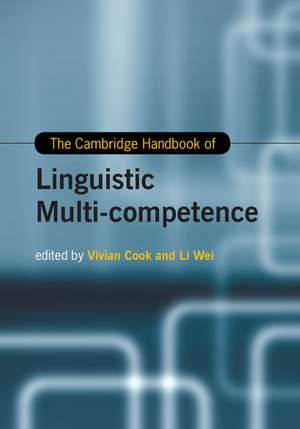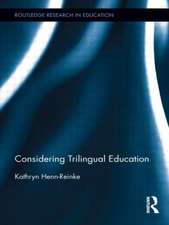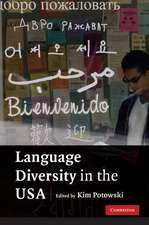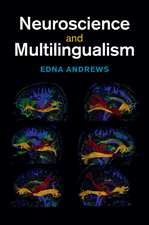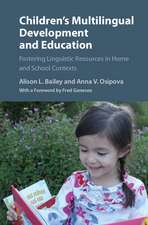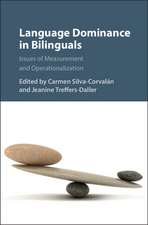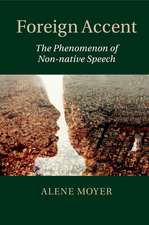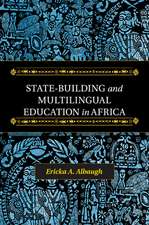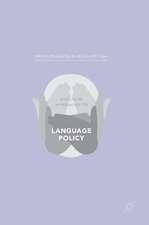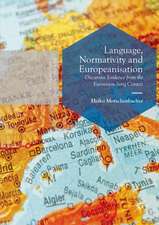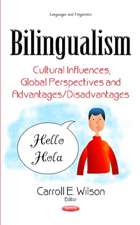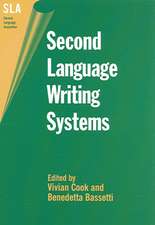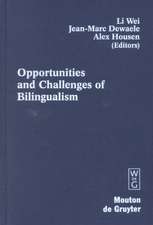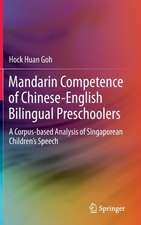The Cambridge Handbook of Linguistic Multi-Competence: Cambridge Handbooks in Language and Linguistics
Editat de Vivian Cook, Li Weien Limba Engleză Hardback – 25 apr 2016
Din seria Cambridge Handbooks in Language and Linguistics
-
 Preț: 257.36 lei
Preț: 257.36 lei -
 Preț: 419.59 lei
Preț: 419.59 lei -
 Preț: 282.02 lei
Preț: 282.02 lei - 14%
 Preț: 989.27 lei
Preț: 989.27 lei - 23%
 Preț: 982.81 lei
Preț: 982.81 lei -
 Preț: 421.83 lei
Preț: 421.83 lei -
 Preț: 284.81 lei
Preț: 284.81 lei -
 Preț: 338.63 lei
Preț: 338.63 lei -
 Preț: 297.50 lei
Preț: 297.50 lei -
 Preț: 280.50 lei
Preț: 280.50 lei -
 Preț: 285.18 lei
Preț: 285.18 lei -
 Preț: 284.94 lei
Preț: 284.94 lei -
 Preț: 281.54 lei
Preț: 281.54 lei -
 Preț: 280.68 lei
Preț: 280.68 lei - 19%
 Preț: 495.90 lei
Preț: 495.90 lei -
 Preț: 417.90 lei
Preț: 417.90 lei - 14%
 Preț: 880.33 lei
Preț: 880.33 lei -
 Preț: 419.23 lei
Preț: 419.23 lei -
 Preț: 315.15 lei
Preț: 315.15 lei - 23%
 Preț: 977.84 lei
Preț: 977.84 lei - 23%
 Preț: 1493.38 lei
Preț: 1493.38 lei -
 Preț: 419.93 lei
Preț: 419.93 lei - 19%
 Preț: 451.06 lei
Preț: 451.06 lei - 23%
 Preț: 949.77 lei
Preț: 949.77 lei - 23%
 Preț: 1066.00 lei
Preț: 1066.00 lei - 14%
 Preț: 989.06 lei
Preț: 989.06 lei -
 Preț: 347.32 lei
Preț: 347.32 lei -
 Preț: 370.92 lei
Preț: 370.92 lei - 23%
 Preț: 1075.01 lei
Preț: 1075.01 lei - 11%
 Preț: 507.18 lei
Preț: 507.18 lei - 23%
 Preț: 753.13 lei
Preț: 753.13 lei -
 Preț: 473.75 lei
Preț: 473.75 lei -
 Preț: 468.73 lei
Preț: 468.73 lei - 23%
 Preț: 1027.19 lei
Preț: 1027.19 lei -
 Preț: 398.99 lei
Preț: 398.99 lei -
 Preț: 398.39 lei
Preț: 398.39 lei
Preț: 1023.97 lei
Preț vechi: 1329.83 lei
-23% Nou
Puncte Express: 1536
Preț estimativ în valută:
195.100€ • 212.97$ • 164.75£
195.100€ • 212.97$ • 164.75£
Carte tipărită la comandă
Livrare economică 21 aprilie-05 mai
Preluare comenzi: 021 569.72.76
Specificații
ISBN-13: 9781107059214
ISBN-10: 1107059216
Pagini: 574
Ilustrații: 14 b/w illus. 21 tables
Dimensiuni: 182 x 257 x 35 mm
Greutate: 1.32 kg
Editura: Cambridge University Press
Colecția Cambridge University Press
Seria Cambridge Handbooks in Language and Linguistics
Locul publicării:New York, United States
ISBN-10: 1107059216
Pagini: 574
Ilustrații: 14 b/w illus. 21 tables
Dimensiuni: 182 x 257 x 35 mm
Greutate: 1.32 kg
Editura: Cambridge University Press
Colecția Cambridge University Press
Seria Cambridge Handbooks in Language and Linguistics
Locul publicării:New York, United States
Cuprins
1. Premises of multi-competence Vivian Cook; 2. Research questions and methodology of multi-competence Goro Murahata, Yoshiko Murahata and Vivian Cook; 3. Multi-competence in Second Language Acquisition: inroads into the mainstream? Lourdes Ortega; 4. Not through a glass darkly: refocusing the psycholinguistic study of bilingualism through a 'bivocal' lens Jyotsna Vaid and Renata Meuter; 5. Multilingualism research Rita Francheschini; 6. Multi-competence and dynamic/complex systems Kees de Bot; 7. Multi-competence and dominant language constellation Larissa Aronin; 8. Consequences of multi-competence for sociolinguistics research Li Wei; 9. A usage-based account of multi-competence Joan Kelly Hall; 10. Multi-competence and syntax Éva Berkes and Suzanne Flynn; 11. Syntactic processing Leah Roberts; 12. Language and cognition in bilinguals Annette M. B. de Groot; 13. Gestures in multi-competence Amanda Brown; 14. Pragmatic transfer in foreign language learners: a multi-competence perspective I-Ru Su; 15. Multi-competence and endangered language revitalization Tracy Hirata-Edds and Lizette Peter; 16. Multi-competence and first language attrition Bregtje Seton and Monika S. Schmid; 17. Cognitive consequences of multi-competence Panos Athanasopoulos; 18. Space, motion and thinking for language Anna Ewert; 19. Multi-competence and personality Jean-Marc Dewaele; 20. Multi-competence as a creative act: ramifications of the multi-competence paradigm for creativity research and creativity fostering education Anatoliy V. Kharkhurin; 21. Multi-competence and language teaching Virginia M. Scott; 22. Multi-competence and emotion Jean-Marc Dewaele; 23. Multi-competence and English as a lingua franca Ian MacKenzie; 24. A critical reaction from second language acquisition research David Singleton; 25. Questions of multi-competence: a written interview on issues raised in this book Guillaume Thierry; 26. Epilogue: multi-competence and the translanguaging instinct Li Wei.
Recenzii
'… a true tour de force. Its broad scope, covering everything from methodology to learning and teaching and representing a variety of original approaches to traditional language learning research, makes it a must read for anyone interested in what it means to know more than one language.' Susan M. Gass, Distinguished University Professor, Michigan State University
'… constitutes a major landmark that will help shift assumptions away from thinking of monolingualism as the norm to accepting multilingualism as the default condition for human language ability. The chapters are written by top scholars in all aspects of the language sciences, producing a collection that is compulsory reading for researchers, educators, and clinicians.' Ellen Bialystok, Distinguished Research Professor of Psychology, York University, Toronto
'… wonderfully rich in its state-of-the-art delineation of linguistic multi-competence approaches to study of individuals and communities previously known as merely 'bilingual'. From translanguaging to creativity in language use, language acquisition to attrition, syntax to emotion and personality, the range of the topics (and the authors) reflects the broad extension Cook's concept of multi-competence has achieved. I plan to use this book regularly in the neurolinguistics classes I teach on bilingualism.' Loraine K. Obler, Distinguished Professor, City University of New York Graduate Center
'Vivian Cook's inspiring notion of multi-competence has sown seeds in many different areas of language research and this collection that Li Wei and he have put together provides ample proof of that. This should rapidly become standard reading for all these interested in enlightened approaches to language use and language users, monolinguals and multilinguals alike.' Mike Sharwood Smith, Emeritus Professor of Languages, Heriot-Watt University, Edinburgh and Honorary Professorial Fellow, University of Edinburgh
'… constitutes a major landmark that will help shift assumptions away from thinking of monolingualism as the norm to accepting multilingualism as the default condition for human language ability. The chapters are written by top scholars in all aspects of the language sciences, producing a collection that is compulsory reading for researchers, educators, and clinicians.' Ellen Bialystok, Distinguished Research Professor of Psychology, York University, Toronto
'… wonderfully rich in its state-of-the-art delineation of linguistic multi-competence approaches to study of individuals and communities previously known as merely 'bilingual'. From translanguaging to creativity in language use, language acquisition to attrition, syntax to emotion and personality, the range of the topics (and the authors) reflects the broad extension Cook's concept of multi-competence has achieved. I plan to use this book regularly in the neurolinguistics classes I teach on bilingualism.' Loraine K. Obler, Distinguished Professor, City University of New York Graduate Center
'Vivian Cook's inspiring notion of multi-competence has sown seeds in many different areas of language research and this collection that Li Wei and he have put together provides ample proof of that. This should rapidly become standard reading for all these interested in enlightened approaches to language use and language users, monolinguals and multilinguals alike.' Mike Sharwood Smith, Emeritus Professor of Languages, Heriot-Watt University, Edinburgh and Honorary Professorial Fellow, University of Edinburgh
Descriere
A compelling account of the multi-competence view, which explores the similarities and differences between bilinguals and monolinguals.
